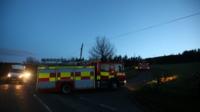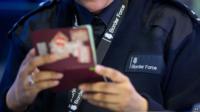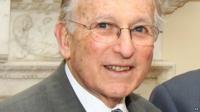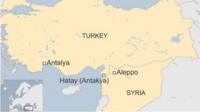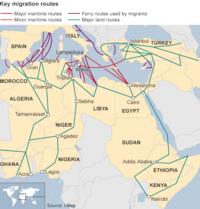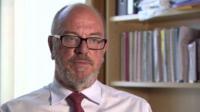
The NHS is facing a "substantial financial problem" which politicians are ignoring in the election campaign, the former head of the service says.
Sir David Nicholson, who retired last year, told the BBC the NHS in England was accruing large deficits which would become "crystal clear" later this year.
But he said instead of talking about how to address these, politicians were focusing on expanding services.
He said the situation caused him "very great concern".
In an interview for BBC Radio 4's Today programme, Sir David - who ran the NHS in England for eight years - said that because there was an election period, the NHS was unable to publish the latest report on its financial position.
But he said it was "pretty clear in the NHS that there is a substantial financial problem, particularly in the hospital sector" which would become "crystal clear" in the autumn.
During the interview he said:
- It would be "helpful" if Labour committed to an extra £8bn of funding, as the Conservatives and Liberal Democrats have
- But all parties needed to make it available immediately, not by the end of the parliament
- Politicians were talking about extra services when there was already a "financial hole"
- Planned NHS efficiencies of £22bn were a "big ask"
- Failure to achieve them would lead to "managed decline" of the NHS and patients waiting longer for treatment
- He expects "emergency action" such as vacancy freezes to tackle the financial difficulties
- The coalition government's NHS reforms were a "surprise" and "significant distraction"
- He defended his role in Stafford Hospital scandal where he spent 10 months in charge of the local health authority in 2005 and 2006
Policy guide: Health and care
This issue includes NHS funding, GP access and social care, particularly of older people.
Sir David predicted the scale of the problem would be bigger than the one he inherited in 2006 on becoming NHS chief executive, when the health service had accrued a £1bn deficit.
"I have not heard in most of the conversations politicians are having at the moment about what they're going to do about that financial hole.
"They want to talk about extra services and extra investment when actually there is a problem there to face."
He said the NHS would have to take "emergency action" such as vacancy freezes.
But he added: "It will also mean the politicians having to suspend some of their ambitions about the new things they want to do while some of the money that's being promised to the NHS is spent dealing with that particular operational problem."

Who is Sir David?
Sir David Nicholson spent more than 30 years working in the health service. His first chief executive post was in 1988 at Doncaster and Montagu Hospital Trust and he moved into regional NHS management in the late 1990s and became head of the Birmingham and Black Country health authority in 2003.
Two years later he also took charge of two neighbouring organisations, including the one that oversaw Stafford Hospital.
He became chief executive of London's health authority in April 2006, but within months took over from Lord Crisp to run the whole health service - a job he held until last April. He now advises governments across the world about health care.

Sir David also said the financial problems were going to be there for the medium term.
He told the BBC: "We need to institute proper financial discipline in the system... and to make some short-term decisions, to enable us to be in a position where literally we're not building on sand; that actually there is a stable financial base on which you then can take forward the big changes that are needed."
The ex-NHS boss said change would require political consensus.

Analysis
By Nick Triggle, health correspondent
Sir David Nicholson is articulating what those in the health service have been saying to each other throughout this election campaign: that politicians are living in a parallel universe.
All the evidence suggests the NHS needs extra money just to stand still.
But while politicians have promised to cough up, they are all twinning that extra money with promises of more. More doctors and nurses, faster treatment and seven-day services.
NHS staff have met this with a mix of resignation and despair - Unison has already warned of industrial action over the Conservatives plan for seven-day services.
But it will also mean whichever party, or parties, form the next government, the pressure will be on to deliver.
After promising so much, the electorate will be expecting more than many experts predict is possible to deliver.

-
That could fund 100 hospitals
-
New ways of working could save £22bn
-
But NHS still needs an extra £8bn
That could fund 100 hospitals
New ways of working could save £22bn
But NHS still needs an extra £8bn
Thinkstock
'Managed decline'
Last autumn Sir David's successor Simon Stevens set out a five-year plan for the NHS in which he said the health service would need an extra £8bn by 2020 - something the Conservatives and Liberal Democrats have committed to in this campaign.
Sir David said it would be "helpful" if Labour made clear whether it too would commit to this figure, which he said needed to be spent at the beginning of the parliament.
The call for an extra £8bn a year was on the basis that the NHS could make £22bn of efficiency savings.
But Sir David cast doubt on whether the NHS could deliver this scale of savings, saying it was "a big ask".
"There is no healthcare system in the world that's delivered this scale. But you could get close.
"But it means actually a united political clinical and managerial leadership in the NHS with a proper debate and discussion with the population about what this all means in practice," he said.
Sir David has warned that if the savings are not made, it could lead to a "managed decline", which would involve patients waiting longer for treatment, new drugs not being made available straight away and it becoming more difficult to see a GP.
'Really challenging'
Lib Dem Deputy Prime Minister Nick Clegg said Sir David and his successor were right to expect parties to explain how they would come up with the funding required for the NHS.
He said the Lib Dems had been "very clear" about where the extra £8bn a year would come from, citing plans to change capital gains tax relief and by tying NHS spending to the proceeds of economic growth.
A Conservative spokesperson said: "We agree that the NHS faces a significant financial challenge over the next Parliament. This is why we have committed to finding at least an extra £8bn a year by 2020."
Labour says it will provide an extra £2.5bn funding a year.
Anita Charlesworth, chief economist at the Health Foundation, said she agreed with Sir David.
She said: "NHS finances can only be described as dire at the moment, three-quarters of our hospitals can't balance their books and at the turn of the year they were running a deficit of £900m.



